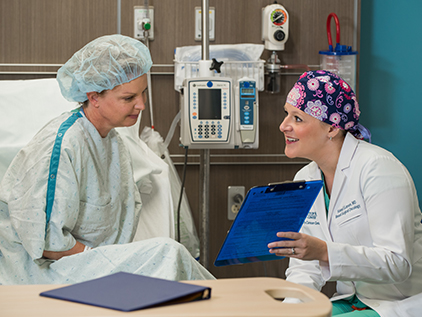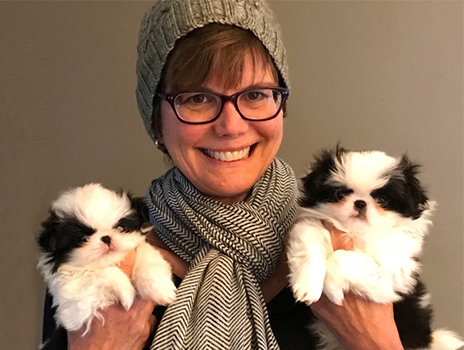- Home
- News Room
- Patient Stories Search Page
- Lisa White A Breast Cancer Survivors Best Friend
August 13, 2019
In January 2015, Lisa White thought of herself as a lucky dog. She had a booming 25-acre pet resort. Her show dogs were winning awards at national competitions. She had a successful pet-training business and was married to Clark, the man of her dreams. She was about to celebrate her 10th cancer-free year.
Then she received the phone call that would turn her world upside down. At age 52, Lisa was diagnosed with breast cancer for the 2nd time. Overcome with dread, Lisa wondered, “How can I possibly survive cancer twice?”
New breast cancer found
Back in 2005, Lisa had been diagnosed with ductal carcinoma in situ (DCIS), a noninvasive stage 0 breast cancer. She was treated at The University of Kansas Cancer Center with a lumpectomy, radiation plus 5 years of Tamoxifen, the standard protocol at that time. After remission, the cancer team monitored Lisa with regular mammogram and ultrasound screenings.
“That’s how they spotted my new primary cancer,” says Lisa. According to her breast medical oncologist Qamar Khan, MD, “Lisa had an early stage but aggressive form of breast cancer, known as HER2-positive.”
Panic followed by a breast cancer treatment plan
A self-described go-getter, Lisa researched her new diagnosis online. The results were frightening. Without realizing it, Lisa was reading outdated internet articles. Treatment strategies for breast cancer change faster than for almost any other disease.
It was time to meet with the experts at The University of Kansas Cancer Center. Dr. Khan shared the latest treatment protocols and a more optimistic prognosis. In addition to chemotherapy, Lisa would receive 1 year of Herceptin®, a drug that targets HER2-positive breast cancer to prevent cancer cell growth.
Having a treatment plan in place helped, but panic was still getting the best of Lisa. She contacted a breast surgical oncologist to perform her double mastectomy. But her breast surgeon did not want to operate until Lisa’s anxiety was under control. She referred Lisa to a therapist who recommended visualization techniques. The weight of worry began to lift.
Lisa also consulted with breast plastic surgeon James A. Butterworth, MD, to discuss reconstruction options. She knew he was the right doctor when he walked through the door wearing stylish cowboy boots. Lisa was also thrilled to discover she could augment her breast size. “I’d been an A-cup my whole life. I told him I wanted to be a little curvier.”
Behind the scenes, Lisa’s breast cancer team worked continuously to formulate and maintain a treatment plan for her. The University of Kansas Cancer Center employs a multidisciplinary approach to care. Each team includes a breast surgeon, breast medical oncologist, radiation oncologist, radiologist, plastic surgeon, [link: genetic testing and counseling page genetic counselor and nurse navigator.
Two-time breast cancer survivor
Once treatment began, Lisa began to feel in control again. “I put my head down and plunged forward.” She even turned her chemo treatments into picnic dates. Lisa would pack lunch and a movie, with Clark always by her side.
Clark has been Lisa’s rock in the face of breast cancer twice. She met Clark in November 2004, before she was initially diagnosed with DCIS in January 2005. They celebrated their 12th wedding anniversary in January.
In addition to her adoring husband, Lisa believes her incredible support system was essential to her success. The entire medical team kept her spirits up. Her sister Missy made her laugh. Her friend Kim shared cancer experiences. And Lisa’s former husband and close friend, Mark Delich, came to the rescue by managing her business, Chapel Hill Pet Resort, in her absence. Through it all, Lisa was motivated by the daily needs of her 24 Japanese Chin dogs.
Dr. Khan says, “Lisa was always upbeat in her fight against breast cancer.” He also recalls that every visit with Lisa was a 2-way consultation. He would counsel her about breast cancer. And she would counsel him about dogs. “Lisa finished treatment with a 98% chance of being completely cured of her cancer. I ended up getting a beagle. I call that a win-win.”
“I love my life so much,” says Lisa. “I’m thankful for everyone at The University of Kansas Cancer Center. They made me a 2-time breast cancer survivor.”
As with all treatments, individual patient results vary. It is important to discuss your treatment options with your healthcare provider.

Your best option for beating cancer
The Women’s Cancer Center at The University of Kansas Cancer Center focuses on breast and gynecologic cancers, providing specialized care to women.
